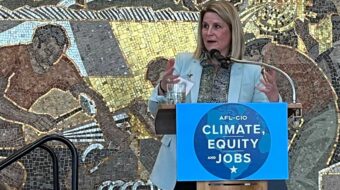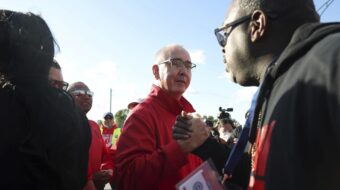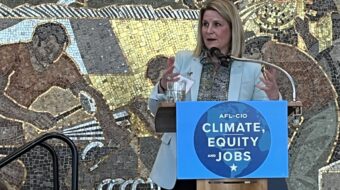WASHINGTON – Come hell or high water – in this case, the latest in D.C.’s year of downpours – hundreds of unionists gathered on Capitol Hill on May 7 to campaign against “fast-track” trade legislation and the anti-worker trade treaties the measure would lead to.
And after hearing a parade of pro-worker lawmakers denounce the pacts and fast-track, the crowd, exhorted by Communications Workers President Larry Cohen, marched off to lobby lawmakers to oppose the schemes.
The rally was the latest in a campaign, which unions, consumer groups, environmentalists and their allies appear to be winning for now, against fast-track, also called Trade Promotion Authority (TPA).
TPA would let presidents rush legislation through Congress implementing trade pacts – pacts lacking worker rights and environmental protection and even banning local Buy American laws – with little debate, no changes and on single up-or-down votes in each house.
Instead, the unionists, from the Communications Workers, the American Federation of Government Employees, the Letter Carriers, the Postal Workers, the Teamsters, the United Food and Commercial Workers, AFSCME, the Machinists, the Fire Fighters, the AFL-CIO, the Painters, the Seafarers, and the Electrical Workers, chanted what they really want: “Fair trade, not free trade.” Green group members and the National Consumers League joined them.
“It’s all of us in this together, Republican or Democrat,” a hoarse Cohen rasped into the microphone. “Fair trade must work for the American people, not just multi-national corporations.”
Congress passed the first such pact under fast track, NAFTA, the controversial U.S.-Mexico-Canada “free trade” treaty, 20 years ago. It’s cost hundreds of thousands of well-paying U.S. jobs since then, speakers said. So have subsequent “free trade” pacts, with Central America and Korea. Now the administration and business are lobbying for TPA to push through pacts with Pacific nations and with Europe. The Trans-Pacific Pact (TPP) is the big threat, speakers said.
“We know what fair trade looks like, but we have yet to see it,” declared Rep. Rosa DeLauro, D-Conn., an influential lawmaker who has already gathered 150 other House Democrats on a letter to Obama declaring they will vote against fast-track. Almost 40 Republicans have signed similar letters. That opposition has been enough to stall fast-track, and the trade pacts with Europe and the Pacific nations, too.
“We have to decide whether we’re going to be a nation where those who played by the rules can work hard and get ahead” and create middle-class jobs, or one “of very few haves and millions of have-nots,” she added. “We’ve seen this movie before, with NAFTA.”
Rep. Sander Levin, D-Mich., top Democrat on the House panel that handles trade issues, outlined what a “fair trade” pact should look like. It would include, he said, enforceable worker rights and declaring foreign currency manipulation – which lets other countries subsidize their exports – as unfair trade.
Photo: Shining a light on capitol buildings against secrecy in the nation’s capital has been part of the protests against “fair trade.” The number shining in the dark near the capitol dome represents how many had signed a petition against the trade agreement. StoptheSecrecy.net












Comments